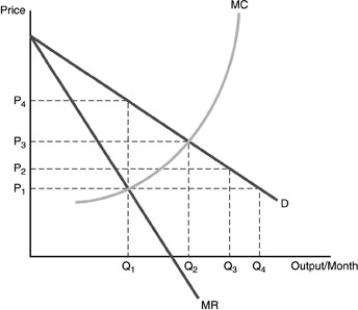
-Refer to the above figure. Which of the following statements is true?
A) Under perfect competition, the efficient price is charged, which is the lowest price possible (  ) while under monopoly output is too large (
) while under monopoly output is too large (  ) and price is too high (
) and price is too high (  ) .
) .
B) Under perfect competition price equals marginal cost (  ) while under monopoly price (
) while under monopoly price (  ) is greater than marginal cost (
) is greater than marginal cost (  ) .
) .
C) The rate of output is the same under both monopoly and perfect competition (  ) , but price is higher under monopoly (
) , but price is higher under monopoly (  rather than
rather than  ) .
) .
D) Price equals marginal cost under both monopoly and perfect competition, but output is too low under monopoly (  instead of
instead of  ) .
) .
Correct Answer:
Verified
Q341: The social cost attached to monopolies is
Q356: Monopolies are discouraged in the United States
Q356: Compared to an efficient perfectly competitive industry,
Q357: Conclusions about the misallocation of resources under
Unlock this Answer For Free Now!
View this answer and more for free by performing one of the following actions

Scan the QR code to install the App and get 2 free unlocks

Unlock quizzes for free by uploading documents